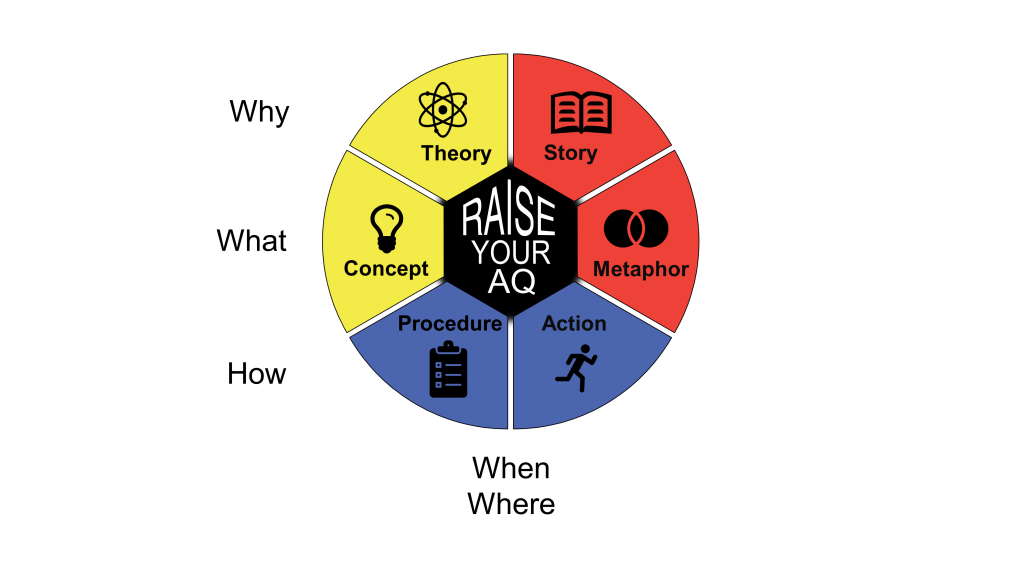Brian Glibkowski has developed a typology of six answer types, that you can use in your next conversation, in order to provide elevated answers to important questions
You have Zoom fatigue. You miss coffee at a café with colleagues. You miss picking up on body language (the full body, not just a blurry head shot). You miss meandering but insightful discussions around the water cooler. Have we forgotten how to have meaningful conversations?
Machete in hand, you are hacking through Zoom call after Zoom call. As you clear the brush and trees in front of you, you must not mistake the ‘trees for the forest.’ It is tempting to conflate food and beverage, leisurely pace, and even body language (all representing the trees) with communication itself (the forest; the big picture). Going back to the Shannon-Weaver model from 1948, the big picture perspective is that communication is the transfer of knowledge from one party to another.
My advice to have meaningful conversations on Zoom is to focus on questions and answers and stop lamenting the dehumanising aspects of Zoom (that is just a distraction). Meaningful conversations start with questions and end with answers (knowledge transfer).
Provide answers. Raise your AQ
To turn your Zoom calls into meaningful conversations, you need to have meaningful questions and answers. Fortunately, we know a lot about questions. Going back to grade school you have many ways to organize and use questions. For example, you can think about open and closed questions or the 6-WH Questions (what, why, who, when, where, how). You can be intentional about anticipating and asking questions during your next Zoom call. Frankly, questions are easy (compared to answers), and you may be a master at questions now.
The difficult part of the conversation equation is providing answers. You can easily discuss typologies of questions: open/closed and the six-WH questions. However, outside of my research, you are never taught a typology of answers, in grade school or at any age. In other words, there is no framework to organise answers. This is a big problem. For the first time, I have developed a typology of six answer types (story, metaphor, theory, concept, procedure, action) that you can use in your next conversation. I refer to this framework as Answer Intelligence (AQ)™. AQ is the ability to provide elevated answers to important questions.

Without answers a meaningful conversation is not possible. Imagine a sales manager and an inexperienced sales rep, fresh out of college, that is struggling with the negotiation phase of the sales process. Deals are not closing. They have a meaningful conversation over Zoom…
Sales REP: ‘I’m struggling with closing deals and negotiations with clients. I’m a little embarrassed to ask, but What is negotiation? It seems obvious, but I’m missing something.’
Sales MANAGER: ‘Negotiation is the ability to satisfy the needs of each party by engaging in problem identification (to understand needs), search for alternatives (to solve the problem), and outcome selection (where each side benefits).’
[The sales manager starts by defining negotiation as a concept.]
Sales MANAGER: ‘In other words, negotiation is like a pizza. We can increase the size of the pizza by engaging in problem identification and search for alternatives. The pizza gets bigger and the potential value in the negotiation gets bigger. Then, distributing the pizza is determining the size of the slices. If you distribute the pieces equally everyone will want to go out to dinner again. If you take all the slices yourself, you will not be invited to dinner again.’
[This metaphor explains that negotiation is like the size and distribution of a pizza. By using a concept and metaphor the sales rep knows the answer to ‘What negotiation is.’]
Sales MANAGER: ‘I want you to understand Why negotiation is important.’
[The sales manager may want to address this implicit why question, perhaps before it is asked by the sales rep.]
Sales MANAGER: ‘Consider the story of two sisters and the orange.’
[This is a famous story first told 100 years ago by Mary Parker Follet, the ‘mother of modern negotiation theory’].
Sales MANAGER: ‘Both sisters wanted the orange for recipes. So, they decided to
cut the orange in half, they each took a side. Did everything work out? No. As
it turns out, one sister needed the peel for her recipe and the other sister
needed the orange slices for the juice. Neither could make their recipe with
half the orange.
The sisters, like most negotiators, got it partially correct. In this case they
wanted to split value equally, but they did not explore each other’s problems
(which parts of the orange each needed), nor possible alternatives to meet
their needs.’
[Then the sales manager could pivot to theory to make the point clear.]
Sales MANAGER: ‘I learned at a sales workshop several years ago that when you focus on joint problems, alternatives for each side, and split value equally, that it is called Integrative Negotiation. Integrative Negotiation is related to important sales outcomes like customer loyalty and the highest average revenue per account (ARPA).’
[The sales manager identified two theories: integrative negotiation Loyalty; Integrative Negotiation ARPA]
[Armed with knowledge of what negotiation is and why it is important, the sales rep might ask a practical question.]
Sales REP: ‘Can you explain How I would go about doing Integrative Negotiation with my next prospect?’
Sales MANAGER: ‘I would break up the negotiation process into three steps. First, I would set up a framework agreement—an agreement on how to negotiate. This means you want to discuss the ground rules for the negotiation. At this point I would discuss that you plan on approaching things in an integrative (or win-win) way. Second, I would focus primarily on creating value, by focusing upon problem identification and search for alternatives. Third, I would move to the outcome selection phase and make sure to split value 50/50. Of course, there are feedback loops, and a lot of times when you are in the outcome selection phase you go back to a prior phase.’
Sales REP: ‘Can you explain how feedback loops work?’
Sales MANAGER: ‘Most sales reps try to provide one offer. It might be a fair offer, but it comes across as take-it-or leave it. Those that understand integrative outcome selection will make multiple offers, which gives the other party options to choose from, and might even lead to more discussion about problems and alternatives, as different options are often combined to make yet another alternative and/or trigger a further discussion of problems to be solved. This is what I mean by a feedback loop in the negotiation process.’
[The sales manager answers the how to negotiate question with a procedure that is mostly linear, with feedback loops. Also, some important actions are outlined like a 50/50 split of value and multiple offers.]
The preceding was an example of a High AQ conversation that features elevated answers to important questions. You can bet the conversation was meaningful to the sales rep who ended up closing their next deal.

Dr Brian Glibkowski is an Associate Professor of Management at North Central College, CEO of Semplar Science Corp and author of Answer Intelligence: Raise your AQ.
High AQ conversations can occur for any topic. Learn more at www.RaiseYourAQ.com. Please check out the Five High AQ practices that distinguish expert communicators, but can be learned by anyone.



